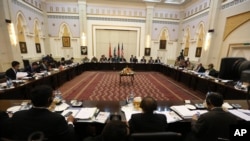With the announcement of a new round of Afghan peace talks by the first week of March, Pakistan's military appears to be retaining its role as a key dealmaker in the process.
On Monday, Pakistan’s army chief, General Raheel Sharif, met officials from Qatar, where the Taliban maintain a political office, to prepare the way for the talks, which are expected to take place in Islamabad.
Pakistan's military leaders have rarely taken such a public role in the Afghan peace process. The country's spy agency has maintained ties with the Afghan Taliban since the group came to power. Since the 2001 U.S.-led invasion, Afghan and U.S. officials have accused Pakistan of giving safe harbor to senior Taliban leaders and allowing militants to use Pakistan's border regions to plan attacks.
Pakistani authorities deny the allegations, but their relations with the Afghan Taliban are seen as important to the peace talks, Pakistan defense analyst Hasan Askari told VOA Deewa.
The Pakistani military "has a long history of dealing with the Afghan Taliban and can exert its influence over [the] Taliban," Askari said.
Afghan President Ashraf Ghani has accused the Taliban of being a proxy force for Islamabad's regional interests. However, the president has also defended involving Pakistan in the peace talks.
Key realization
Hamid Arslan, a defense analyst associated with Washington-based National Endowment for Democracy, said the Afghan government has realized the significance of the Pakistani military's sway over the Afghan Taliban.
"I think President Ghani realizes that reaching an agreement with Pakistan and especially the Pakistani military establishment will be part of an agreement reached with the Taliban," he said.
Others see Pakistan military’s influence as necessary after years of inaction by the political leadership in both Kabul and Islamabad.
Afghan analyst Sarwar Ahmadzi told VOA Urdu, “Between Afghanistan and Pakistan, the political leaders did not come to an agreement to deal with the Taliban negotiations, and that is why the [Pakistani] army stepped in. I think the international community has more confidence in [the] Pakistani military [leadership’s ability] to bring [the] Taliban to the negotiating table."
The peace talks have been suspended since July, when it was revealed that the Taliban's longtime leader, Mullah Omar, had been dead for years. Since then, there has been speculation that the Taliban are splintering under their new leader. However, the militants have kept up pressure on Afghan security forces, seizing territory and carrying out attacks that have led to further instability.
The peace talks are expected to go on for months.












